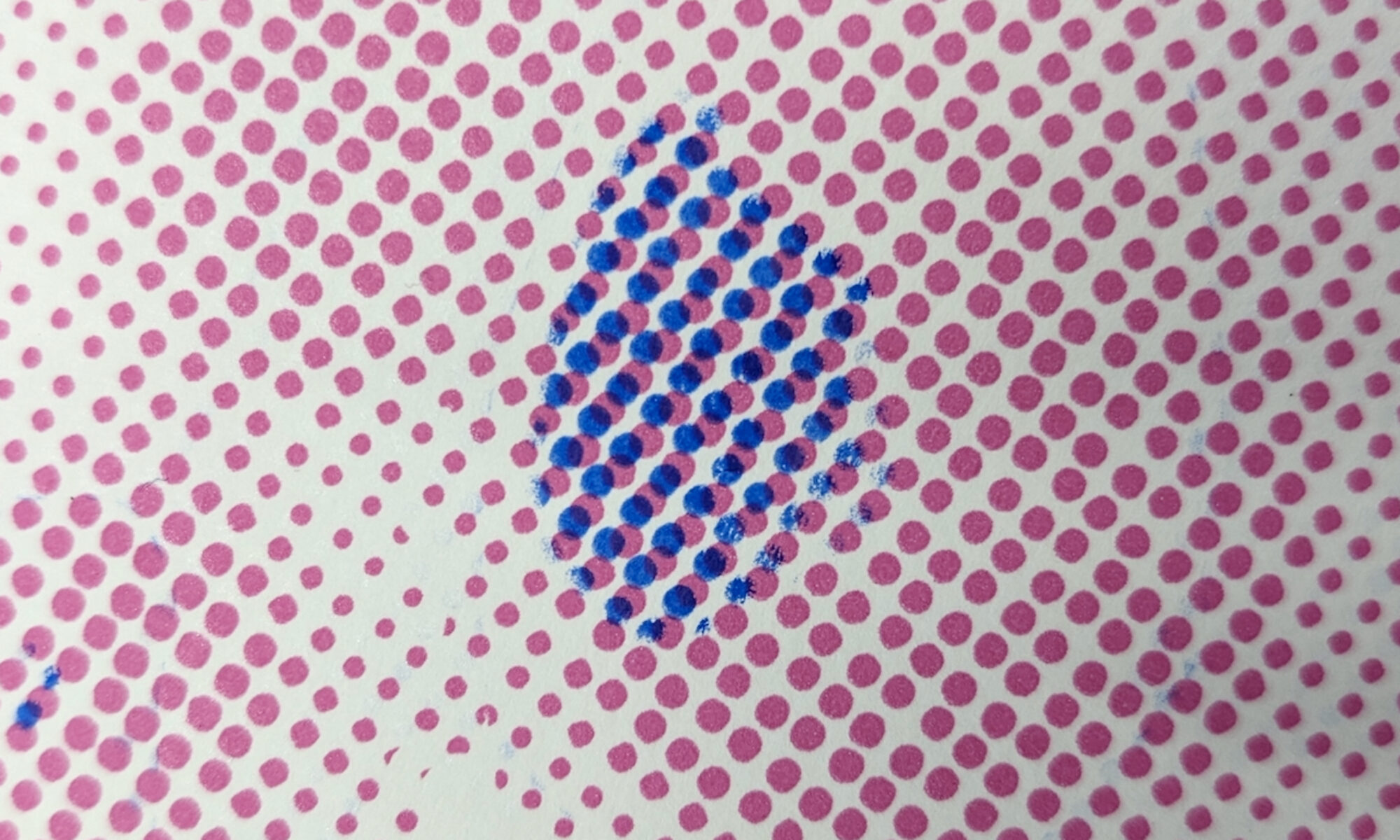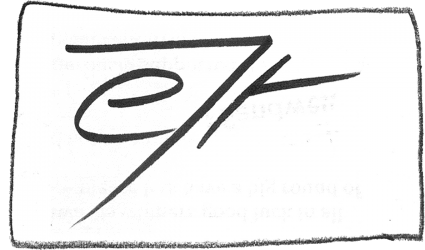Circumstance of Asking

IMPACT10 title was Encuentro, ‘meeting’and there were many new and inspiring meetings of art and people throughout the week of exhibitions and symposia. There were many print exhibitions from Goya to Yamamoto, Diggle, Single, Mitra Kupferminc and Ana Vivoda that it was hard to select what to view. On Tuesday Edinburgh Printmakers exhibited their portfolio of artist prints with a stand out gestural litho by Ren Narbutt.
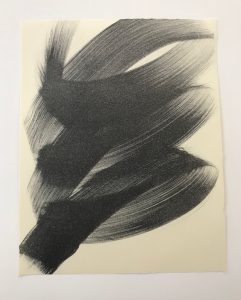
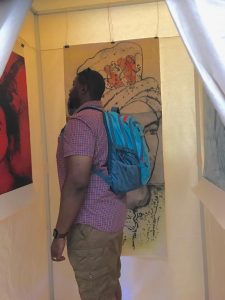

Opposite the EP show was a tent! A long vertical canvas square reaching from floor to ceiling. People were coming in and out, some entering and closing the two curtain ‘doors’ behind them. I wanted to see what artworks were enticing them in. Three drawn and printed portraits invited the viewer to go up close to the images, face to face with them. One Portrait was deep red giving the tent space a red glow. The drawings were evocative, simple and powerful, reflecting diverse characters.
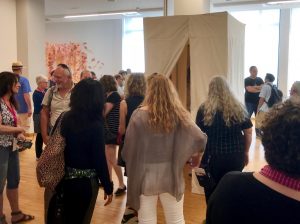
I exited the portrait tent and watched how people looked at the portraits to their left, right and in front and how they entered inquisitively and exited with more intention than when passing by the many wall hung prints. The portrait tent seemed to afford a material viewing experience allowing the portraits more attention from the viewer as they had made a conscious decision to step inside. They had made a choice to view these drawn portraits and been rewarded for their commitment.
As I observed these goings on I noticed a woman was watching too. I asked her if the portrait tent was her work and she smiled : “Yeah.” In that unmistakable Australasian way of saying yes, in a ‘Yes of course’ sort of way.
We briefly talked about the tent and her three portraits within, which I said very much enjoyed and asked how do you go about the making the portraits? “I meet them in the street, bars or venues and ask them if they would like me to make a portrait of them.” I was immediately impressed and interested and we talked some more before she had to talk with her other admirers. Unlike me, I asked her to stand in the entry to the tent for a photograph.
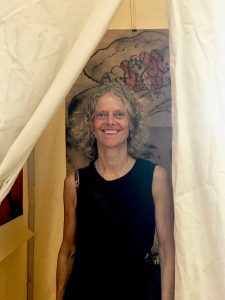
“Lets talk more” we exchanged contacts and when I saw her name was Barbie I could not help but ask: “Is your original name Barbara? Mine is Jonathan not Jonnie? Two ‘ie’s’ – A connection was made.
Barbie Jkar
After a couple appointment hiccups, we met after we had viewed each other’s websites. Barbie is a much more experienced exhibiting artist that I and I was full of anticipation of hearing her views on portraiture. She had just mounted a show of 10 portraits in Melbourne. Surprisingly she was interested in how I had curated my recent High Sheriff portrait show. We talked for half an hour sharing each other’s drawing, print and portrait interests, art and personal experiences. We talked together freely and with ease, getting to know if our initial connection was to be fulfilled. Portraiture is something we are both focused on. We shared other artists of interest and tools of the drawing trade. Barbie is Tasmanian, and her Antipodean direct talking is mixed with an ability to stay quiet, pause from time to time to allow conversation to develop. We could have enjoyed more coffee and sharing, but then came the moment we had been building up to: sharing our approaches to the portrait subject:
“Some days I NEED to draw someone. I know I want to meet someone whose face interests me. I go to places with ‘my looking eyes on’. I will be aware of people in a café, bar, or a music venue and my looking eyes will touch upon a face that I want to draw. There is a moment when it’s as if there is a Light around them. Like a spotlight illuminating their face. I am drawn to draw them.
‘Circumstance of asking’
“I approach them and get into conversation. I Tell them about me as an artist: ‘I draw people’s portraits and I’d like to draw you’. I show them work on my website. I share my previous portrait credentials and evidence of portraits made with people unknown to me at the beginning. I explain I hope to exhibit the pictures in the future, which may be a good opportunity to show friends and family. When I make this first approach I’ve not got to be intense. I am intense, but I’ve not go to exhibit that. I don’t want to scare them. Through this ‘Circumstance of asking’I am hoping to establish a trusting relationship with a subject to make it possible for them to accept me as their portraitist.”
I can imagine Barbie approaching and engaging with a stranger as her ‘looking eyes’ would be replaced by ‘engaging eyes’ that look directly into the person she has selected, while she is balancing between responding and initiating discussion. I can imagine her warm, genuinely interested character beginning the first stage of engagement. However, she has an end goal in mind that is not far from her consciousness in this moment of asking. “Eventually I ask them if they would like to be drawn by me. There are very few occasions that the sitter or I, the artist stop the process and go our separate ways.”
“When it’s a go situation we agree a time to meet at the studio. When they arrive I make some tea, coffee and chat for 15 minutes or so. It is a chat, a further getting to know you and establishing a relaxed relationship before we begin, but I am also looking and assessing what would be the best, most representative, interesting position to place the sitter in. I suppose I am directing them.”
“Then we begin. We are face to face and I have ‘my drawing eyes’ on. It is intense. While I draw we tend to speak about many things. Many times the conversations become quite deep. The sharing of the intimate space together and my concentration provides a situation of trust, where it feels ok to share thoughts, emotions and concerns. After the portrait is completed, in one or two sittings, I have become close with the subjects. The intimacy of the portrait drawing session, when I can get quite physically close, along with the sharing of personal information makes it akin to a counseling session.”
It seems to me that when the process begins the fact that there is an end point/product, not an ongoing relationship, gives Barbie and the sitter a space to fill and feel safe together.
In a speedy ‘screen’ world where celebrity images abound and selfies are everyone’s opportunity to portray themselves, the focused artist and sitter relationship is very special. “
“My show of their portraits was wonderful. Everyone came and celebrated their images and the fact that they were real, on paper with the charcoal, graphite and conte in the gallery for all to see. The portraits are in the world to be shared and the subject to be ‘recognised.’”
I wish I had asked Barbie if we could record our conversation in order I could have quoted her verbatim and got the detail accurately correct, but I think this was the thrust of it.
We went on to talk about my approach, which is not as straight forwardly up front as Barbies’. However I do look to share my portraits of those people that my ‘looking eyes’ are attuned to and my spotlight has illuminated their faces and drawn me to first, smart phone photograph them and then to draw them.
The initial feeling we perceived when we met in front of Barbie’s portrait tent that we are on the same wavelength had been confirmed through our conversation. Barbie suggested we share a beer as the coffee ran out long ago and the sun was shining.
While Barbie got the beers in I reflected on my modus operandi. Our conversation has raised questions for me about whether my premise of discreet capturing of the subject through the smartphone could be developed. I am drawn to the possibilities of creating a ‘circumstance of asking’ that works for me, but I am not there, yet.
We kept talking and Barbie noticed similarities in our drawing selections: the focus on the head, hair, hands, and inclusion of elements of relevant clothing. Barbie tends to draw the torso never the whole body.
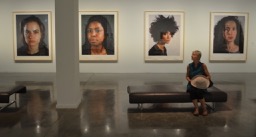
We talked about Australia, Melbourne and Sydney and the immense Chuck Close show at the Sydney MOMA in 2015. Barbie had seen it too and we discussed his approach(es) to portraiture, drawing photography and print. That show was a seminal moment for me as I saw again what printmaking could be. It resurrected a calling to make prints.
Thinking back to my time in Melbourne I remembered I begun portraits in Melbourne that I had not shared with the subjects because I had drawn and printed them in retrospect, in the UK. Barbie wanted to see them and took the phone and its small screen under the shade of the table to see the portraits. She was interested/intrigued to see my choice of subjects on the Melbourne public transport system. It felt good that someone of Barbie’s insight and shared artistic values enjoyed seeing portraits from her part of the world.
This 2 hour meeting of minds in the Spanish sunshine had established we had shared approaches to drawn portraiture. Even though, and perhaps because we live at other ends of the world, I hope we can share more as we make images of people we are drawn to.
September 2018
